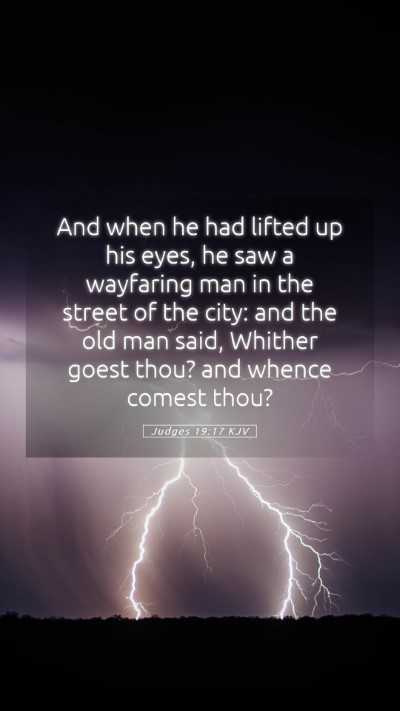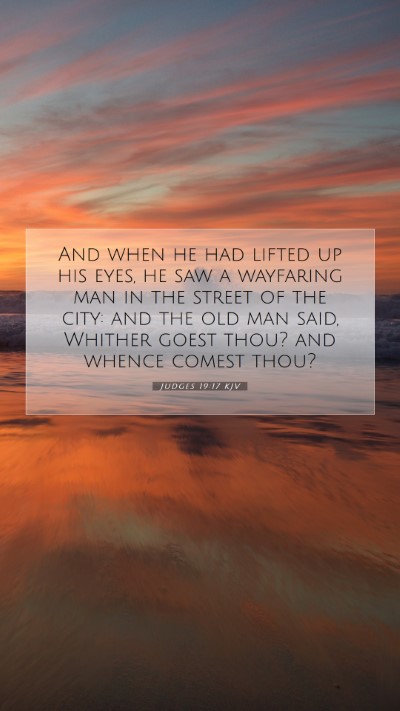Understanding Judges 19:17
Judges 19:17 reads, "And when he lifted up his eyes, he saw a wayfaring man in the street of the city: and the old man said, Whither goest thou? and whence comest thou?" This verse sets the stage for a complex narrative in the Book of Judges, highlighting themes of hospitality, social conditions, and moral decay in Israel during a turbulent period.
Bible Verse Meanings
This passage introduces an encounter between a traveler and an elderly man, emphasizing the importance of hospitality in ancient Israelite culture. The wayfaring man represents not only a physical traveler but also a symbol of seeking refuge within a community.
Bible Verse Interpretations
According to Matthew Henry, this moment reflects the wider societal issues prevalent in Israel at the time. The absence of hospitality signifies a moral decline, illustrating the need for social cohesion and care for the vulnerable in society. Albert Barnes adds that the inquiry of the old man speaks to the communal nature of living; each person’s journey is interconnected with others.
Key Insights
- Cultural Significance: Hospitality was deeply rooted in the customs of the time, portrayed as a moral obligation.
- Social Commentary: The lack of welcome for a traveler reflects deeper societal degradation.
- The Role of the Elderly: The old man symbolizes wisdom and experience, guiding those who are lost or in need.
Bible Verse Explanations
Adam Clarke emphasizes the symbolism of travel within the scripture. The traveler’s journey can be seen as a metaphor for one’s life journey, where encounters with others define our experiences. This narrative beckons readers to consider their roles in welcoming those in need and reflecting on how societal norms affect individual lives.
Scripture Analysis
This verse does not stand alone but invites theological reflection on the entire chapter and broader Biblical context. It prompts inquiry into the treatment of the vulnerable and challenges readers to rethink contemporary practices of welcome and inclusion.
Biblical Exegesis
In exploring the historical context of Judges 19, one must consider the chaos following Joshua’s conquest of Canaan, indicating a period of moral ambiguity and ambiguity in leadership. The question the old man poses is not mere curiosity but a profound inquiry into the traveler’s journey and purpose.
Bible Study Insights
For Bible study groups, this verse serves as a critical point for discussion on the themes of friendship, community support, and the ethics of hospitality. It illustrates how one's journey involves encounters that challenge or affirm one’s beliefs.
Meaning of Bible Verses
Understanding Judges 19:17 requires an appreciation of the moral narrative underscored throughout the Book of Judges, where individuals often faced dire circumstances due to personal and communal failures.
Cross References
- Genesis 18:1-8: The hospitality of Abraham towards strangers.
- Leviticus 19:34: Command to love the stranger as oneself.
- Luke 10:25-37: The Parable of the Good Samaritan, highlighting the importance of caring for others.
Conclusion
Judges 19:17 encapsulates the distillation of human experience—the mutual need for connection, the duty of care, and the reflection on societal integrity. When we consider this verse within its historical, cultural, and moral frameworks, we gain not only understanding but also a deeper appreciation for applying these life lessons in our daily interactions.


